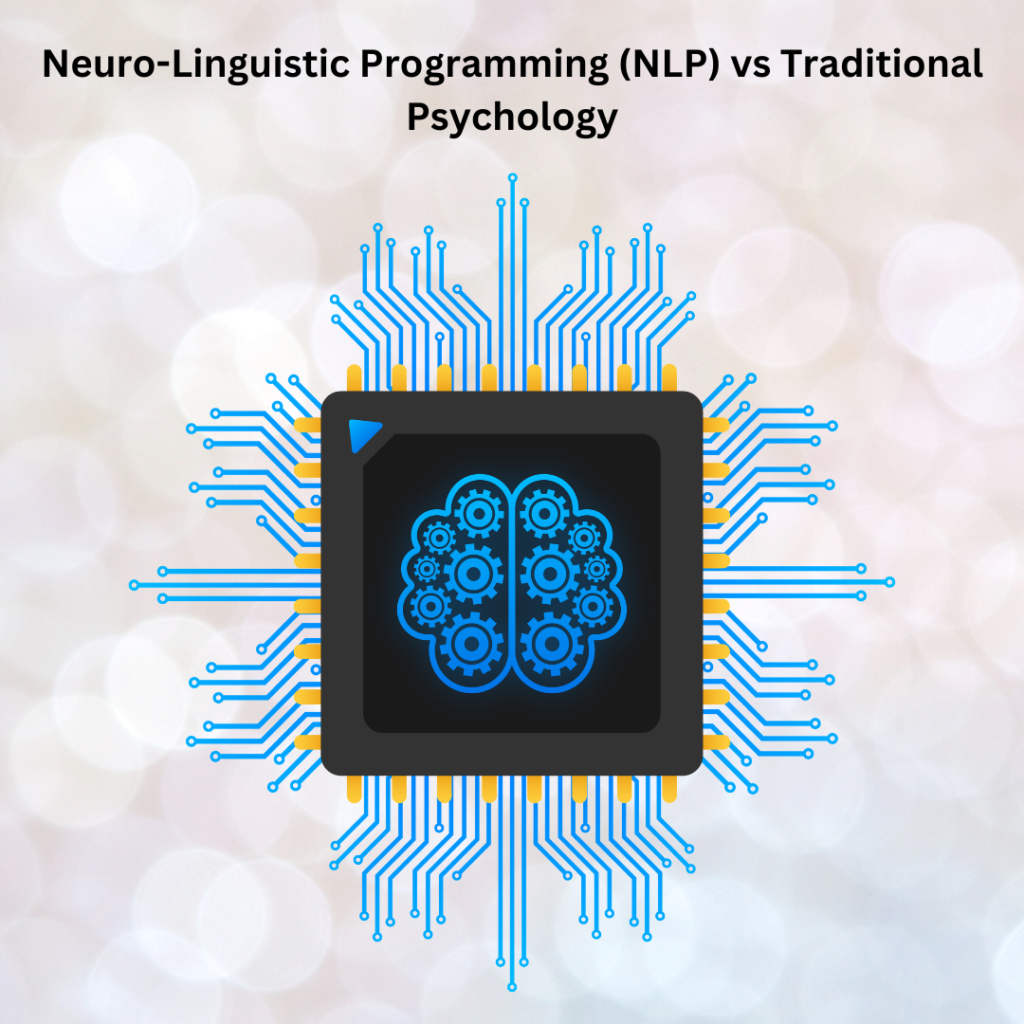Simply said – psychology is the study of human behaviour, whereas
NLP is the study of the structure of subjective experience.
They have certain Similarities:
- Changing Thoughts and Behaviours:
Both psychological approaches and NLP work on identifying and changing thoughts, beliefs, and behaviours that cause problems or distress. They aim to improve individuals’ lives by addressing these cognitive and behavioural patterns.
- Language and Communication:
Both approaches understand that language and communication play a crucial role in shaping our experiences and actions. They use language to change perceptions, challenge beliefs, and support personal change.
- Goal-Setting and Problem-Solving:
Both methods use goal-setting and problem-solving to help people define their goals, tackle challenges, and achieve their aims. By setting clear and achievable goals, individuals are encouraged to take positive steps towards change.
The Key Differences are:
- History/Origin:
• NLP: Developed in the 1970s by Richard Bandler and John Grinder, NLP emerged from observing successful therapists and modelling their techniques for broader personal and professional use. This modern approach was designed to facilitate rapid and effective personal transformation.
• Psychology: Evolved in the late 19th and early 20th centuries with key figures like Wilhelm Wundt (experimental psychology) and Sigmund Freud (psychoanalysis). Over time, it has developed into various therapeutic practices, including cognitive-behavioural and psychodynamic therapies.
- Foundational Approach:
• NLP: Focuses on practical application by modelling successful behaviours and techniques. Rather than being grounded in scientific research, it emphasizes “how” people achieve success, using innovative methods to replicate these outcomes in others.
• Psychology: Rooted in scientific research and evidence-based practices. It explores mental processes and behaviour through diverse approaches like cognitive-behavioural therapy (CBT), psychodynamic theories, and humanistic psychology, aiming to understand the underlying reasons for thoughts and behaviours.
- Focus on the Mind:
• NLP: Emphasizes modifying unconscious thought patterns through structured techniques. It identifies subtle cues and self-imposed restrictions to reprogram mental maps, aiming for rapid, practical results.
• Psychology: Often delves into the unconscious mind and historical conflicts to understand emotional issues and behaviours, including past traumas and developmental factors.
- Therapeutic Focus:
• NLP: Highly structured and goal-oriented, NLP uses specific techniques to produce quick and substantial changes. It focuses on altering unconscious patterns with methods like visualization and metaphorical language, making it a modern and efficient approach to personal development.
• Psychology: Includes both behavioural and psychodynamic approaches. Behavioural methods are short-term and focus on changing behaviours, while traditional psychotherapy is long-term and less structured, aiming to explore deep emotions and integrate various theoretical perspectives.
- Evidence and Scientific Validation:
• NLP: Although still developing, some studies suggest NLP can improve psychological symptoms and quality of life. Research has shown benefits for individuals using NLP techniques, highlighting its potential for effective and rapid change.
• Psychology: Well-supported by extensive scientific research, clinical trials, and peer-reviewed studies. Techniques like CBT have strong evidence for their effectiveness across a range of psychological issues.
- Techniques and Tools:
• NLP: Utilizes innovative techniques like anchoring, mirroring, reframing, and meta-modelling to transform thought and behaviour patterns. These methods are designed for practical application and effective change in everyday situations.
• Psychology: Employs evidence-based methods such as cognitive restructuring, exposure therapy, and behavioural modification to address mental health conditions and enhance emotional well-being.
- Time Frame:
• NLP: Focuses on short-term, goal-oriented interventions. It equips individuals with techniques and insights for ongoing self-exploration and transformation, offering a modern and efficient approach to personal development.
• Psychology: Therapy can be long-term, particularly in psychoanalytic or psychodynamic approaches. Methods like CBT may also require multiple sessions to achieve significant results.
- Medication:
• NLP: Does not involve medication. Instead, it focuses on using techniques to help individuals achieve their goals and manage their issues without pharmaceutical intervention, thus avoiding potential side effects.
• Psychology: May include the use of medication to manage certain conditions, which can have side effects. While medications can be effective, they come with the risk of adverse effects that NLP seeks to avoid.
How to choose between counselling/psychotherapy and NLP?
Psychologists are best for diagnosing mental disorders, assessing IQ, or identifying conditions like dyslexia, as they are trained to perform detailed evaluations and provide clinical diagnoses.
NLP practitioners are well-suited for helping with personal development, overcoming habits, and achieving specific goals after a diagnosis. Depending on your needs, you can choose NLP for practical, goal-oriented strategies or stick with psychological therapy for ongoing support and treatment.

